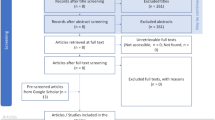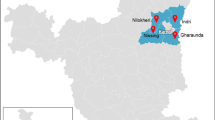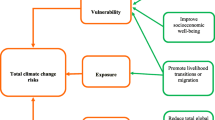Abstract
This paper explores how knowledge is exchanged between agricultural advisors and farmers in the context of sustainable farming practices in England. Specifically the paper examines the nature of the knowledge exchange at the encounters between one group of advisors, agronomists, and farmers. The promotion of best management practices, which are central to the implementation of sustainable agricultural policies in England, provide the empirical context for this study. The paper uses the notion of expert and facilitative approaches as a conceptual framework for analyzing knowledge exchange encounters between agronomists and farmers. Data were derived from semi-structured interviews with 31 agronomists and 17 farmers, in the context of three initiatives promoting a range of best management practices including (a) targeted use of nitrogen (N), (b) use of nutrients within manure, and (c) management practices to improve soil structure. The interviews revealed that, although many agronomist–farmer knowledge exchange encounters are characterized by an imbalance of power, distrust, and the divergence of knowledge, other encounters provide a platform for the facilitation of farmer learning in their transition to more sustainable practices.

Similar content being viewed by others
Notes
BMPs (also referred to as Good Management Practices or Good Agricultural Practices) are based on the principle of improving resource management; although aimed primarily to benefit the environment, they also offer cost savings. Examples relevant to his study include nutrient management by budgeting, reducing and targeting artificial and organic fertilizers; timing cultivation and operations to avoid soil damage and reduce erosion risk; reducing cultivations to prevent structural damage to soil and save energy and labor costs; promoting and managing soil organic matter to improve soil structure. In the USA BMPs have been introduced as a federal initiative, they include soil conservation and other agronomic practices and aim to provide water quality benefits.
For example, in 2002, 96% of farmers used an advisor in the UK (JT Research Agribus 2003) reported on the website Farmers Weekly Interactive (May 2006); and in 2006, four out of five of “barometer” farmers who feature in the UK’s popular farming journal Farmers Weekly employ an agronomist (Farmers Weekly, November 4th, 2005).
A method of cultivation designed to reduce soil erosion. Plowing is carried out across the slope, rather than up and down it, to reduce the flow of water and thus the potential for erosion.
Abbreviations
- AICC:
-
Association of Independent Crop Consultants
- BIAC:
-
British Institute of Agricultural Consultants
- BMPs:
-
Best management practices
- DEFRA, UK:
-
Department for Environment, Food and Rural Affairs
- FRS:
-
Fertilizer Recommendation System
- KEE:
-
Knowledge exchange encounter
- NGO:
-
Non-Governmental Organization
- NPK:
-
Nitrogen, phosphorous, potassium
- SMI:
-
Soil Management Initiative
References
Angell, B., J. Francis, and A. Chalmers, C. Flint. 1997. Agriculture and the rural economy: Information and advice needs. London: DEFRA.
Arce, A.C., and N. Long. 1992. The dynamics of knowledge: Interfaces between bureaucrats and peasants. In Battlefields of knowledge: The interlocking theory and practice of social research and development, eds. N. Long, and A. Long, 211–246. London: Routledge.
Auerswald, K., and M. Kutilek. 1998. A European view to the protection of the soil resource. Soil Tillage Research 46: 9–11.
Bager, T., and J. Proost. 1997. Voluntary regulation and farmers’ environmental behaviour in Denmark and The Netherlands. Sociologia Ruralis 37 (1): 79–90.
Bergsma, E. 1996. The bridge between land use and advisers. Land Husbandry, the International Journal of Soil and Water Conservation 1: 81–93.
Bergsma, E. 2000. Incentives of land users in projects of soil and water conservation: The weight of intangibles. Geojournal 50: 47–54.
Burgess, J., J. Clark, and C.M. Harrison. 2000. Knowledge in action: Actor network analysis of a wetland agri-environment scheme. Ecological Economics 35: 119–132.
Busch, L. 1978. On understanding: Two views of communication. Rural Sociology 43 (3): 450–473.
Carolan, M.S. 2006. Sustainable agriculture, science and the co-production of ‘expert’ knowledge: The value of interactional expertise. Local Environment 11 (4): 421–431.
CEC. 2002. The sixth environment action programme of the European community 2002–2012. http://europa.eu.int/comm/environment/newprg/index.htm. Accessed 1 September 2006.
Cerf, M., D. Gibbon, B. Hubert, R. Ison, J. Jiggins, M. Paine, J. Proost, and N. Röling. 2000, eds. Knowing and learning for change in agriculture: Case studies from industrialised countries. Paris L’institut National de la Recherche Agronomic (INRA) Editions.
Cooper, N.K. 1999. Street level bureaucrats and agri-environmental schemes: The case of the FRCA project officer implementing ESA schemes in England and Wales. PhD Dissertation, King’s College, London.
Coughenour, C.M. 2003. Innovating conservation agriculture: The case of no-till cropping. Rural Sociology 68 (2): 278–304.
Coughenour, C.M., and S. Chamala. 2000. Conservation tillage and cropping innovation: Constructing the new culture of agriculture. Ames, IA: Iowa State University Press.
Curry, N. 1997. Providing new environmental skills for British farmers. Journal of Environmental Management 50: 211–222.
Curry, N., and M. Winter. 2000. The transition to environmental agriculture in Europe: Learning processes and knowledge networks. European Planning Studies, 8 (1): 107–121.
Dalton, G.E. 1980. The educational role of farm management extension work by state advisory services. Journal of Agricultural Economics 31 (2): 149–162.
Department for Environment, Food and Rural Affairs (DEFRA). 2000. Towards sustainable agriculture: A pilot set of indicators. London: Defra Publications.
DEFRA. 2002. The strategy for sustainable farming and food: Facing the future. London: DEFRA Publications.
DEFRA. 2003. Codes of good agricultural practice for the protection of water, air and soil: Summary. London: DEFRA Publications.
DEFRA. 2006. Cross compliance handbook for England. London: DEFRA Publications.
DEFRA. 2007. The protection of waters against pollution from agriculture: Consultation on implementation of the Nitrates Directive in England. London: DEFRA Publications.
Dissanayake, W. 1992. Knowledge culture and power: Some theoretical issues related to the agricultural knowledge and information systems framework. Knowledge and Policy; the International Journal of Knowledge Transfer and Utilisation 5 (1): 65–76.
Dobbs, T.L. 1993. Enhancing agricultural sustainability through changes in federal commodity policy: Marginal versus radical change. Policy Studies Report No. 2. Greenbelt, MD: Henry A. Wallace Institute for Alternative Agriculture.
Dobbs, T., and J. Pretty. 2001. Future directions for joint agricultural-environmental policies: Implications of the United Kingdom experience for Europe and the United States. South Dakota State University Economics Research Report and University of Essex Centre for Environment and Society Occasional Paper. Brookings, SD: University of South Dakota.
Earle, T.R., C.W. Rose, and A.A. Brownlea. 1979. Socio-economic predictors of intention towards soil conservation and their limitation in environmental management. Journal of Environmental Management 9: 225–236.
Eldon, J. 1988. Agricultural change, conservation, and the role of advisors. ECOS 9 (4): 15–20.
Engel, P.G.H. 1990. Knowledge management in agriculture: Building upon diversity. Knowledge in Society 3 (3): 28–35.
Engel, P.G.H. 1997. The social organisation of innovation: A focus on stakeholder interaction. Amsterdam: KIT Publishers.
Eshuis, J., and M. Stuiver. 2005. Learning in context through conflict and alignment: Farmers and scientist in search of sustainable agriculture. Agriculture and Human Values 22 (2): 137–148.
Fearne, A.P. 1990. Communications in agriculture: Results of a farmer survey. Journal of Agricultural Economics 41: 371–380.
Frost, J., and R. Lenz. 2003. Rooted in grass: Challenging patterns of knowledge exchange as a means of fostering change in southeast Minnesota farm community. Agriculture and Human Values 20: 65–78.
Garforth, C., B. Angell, and J. Archer. 2003. Fragmentation or creative diversity? Options in the provision of land management advisory services. Land Use Policy 20 (4): 323–333.
Gasson, R., and B. Hill. 1996. Socio-economic determinants of the level and rate of on-farm innovation. Kent, UK: Wye College.
Giddens, A. 1987. Social theory and modern sociology. Cambridge, UK: Cambridge University Press.
Giles, A.K. 1983. Some human aspects of giving and taking farm management advice. Journal of Agricultural Economics 34: 317–327.
Gray, I., T. Dunn, and E. Phillips. 1997. Power, interests and extension of sustainable agriculture. Sociologia Ruralis 37 (1): 97–113.
Hassanein, N., and J.R. Kloppenburg Jr. 1995. Where the grass grows again: Knowledge exchange in the sustainable agriculture movement. Rural Sociology 60 (4): 721–740.
Hawkins, E. 1991. Changing technologies: Negotiating autonomy on Cheshire Farms. PhD Dissertation, South Bank Polytechnic, London.
Hemidy, L., and M. Cerf. 2000. Managing change in advisory services: Controlling the dynamics of resource transformation and use. In Knowing and learning for change in agriculture. Case studies from industrialised countries, eds. M. Cerf, D. Gibbon, B. Hubert, R. Ison, J. Jiggins, M. Paine, J. Proost, and N. Röling, 351–368. Paris: INRA Editions.
Ingram, J., and C. Morris. 2007. The knowledge challenge within the transition towards sustainable soil management: An analysis of agricultural advisors in England. Land Use Policy 24 (1): 100–117.
Ison, R.L, and D.B. Russell, eds. 2000. Agricultural extension and rural development. Breaking the traditions. Cambridge, UK: Cambridge University Press.
Joint Nature Conservation Council (JNCC). 2002. Environmental effects of the CAP and possible mitigation measures. Report to DEFRA. London: DEFRA Publications.
Jones, G.E., M.J. Rolls, and R.B. Tranter. 1987. Information management in Agriculture British Library Review and Report 5931. London, UK: British Library.
Juntti, M., and C. Potter. 2002. Interpreting and reinterpreting agri-environmental policy: Communication, trust and knowledge in the implementation process. Sociologia Ruralis 42 (3): 215–232.
Kilpatrick, S. 2002. Facilitating sustainable natural resource management: Review of the literature. Prepared for Department of Primary Industries, Water and Environment as part of the evaluation of the Implementation of Best Practice in Sustainable Agriculture project. University of Tasmania.
Kloppenburg, J. Jr. 1991. Social theory and the de/reconstruction of agricultural science: Local knowledge for and alternative agriculture. Rural Sociology 56 (4): 519–548.
Law, J. ed. 1986. Power, action and belief. A new sociology of knowledge? Boston, MA: Routledge and Kegan Paul.
Leeuwis, C. 2000. Learning to be sustainable. Does the Dutch agrarian knowledge market fail? Journal of Agricultural Education and Extension 7 (2): 79–92.
Long, N. 1992. From paradigm lost to paradigm regained. The case of actor-oriented sociology of development. In Battlefields of knowledge: The interlocking theory and practice of social research and development, eds. N. Long, and A. Long, 16–43. London, UK: Routledge.
Long, N., and J.D. van der Ploeg. 1989. Demythologizing planned intervention. Sociologia Ruralis 29: 227–249.
Long, N., and M. Villarreal. 1994. The interweaving of knowledge and power in development interfaces. In Beyond farmer first: Rural people’s knowledge, agricultural research and extension practice, eds. I. Scoones, and J. Thompson, 41–52. London, UK: ITG.
Lowe, P., J. Clark, S. Seymour, and N. Ward. 1997. Moralising the environment: Countryside changes, farming and pollution. London, UK: UCL Press.
Lundberg, C.C. 1997. Towards general model of consultancy: Foundations. Journal of Organisational Change Management 10 (3): 193–200.
Lyon, F. 1996. How farmers research and learn: The case of arable farmers of East Anglia, UK. Agriculture and Human Values 13 (4): 39–47.
Marshall, E.J.P. 2002. Environmental information for agronomists 2002: Needs and provision. A report by the Farmed Environment Company for Crop Protection Association UK Ltd. and UKASTA.
Morgan, K., and J. Murdoch. 2000. Organic vs. conventional agriculture: Knowledge, power and innovation in the food chain. Geoforum 31: 159–173.
Morris, C., and M. Winter. 1999. Integrated farming systems: The third way for European agriculture? Land Use Policy 16: 193–205.
Napier, T.L., C.S. Thraen, A. Gore, and W.R. Goe. 1984. Factors affecting the adoption of conventional and conservation tillage practices in Ohio. Journal of Soil and Water Conservation 39 (3): 205–209.
Natural Resources Conservation Service (NRCS). 2002. FarmBill 2002 summary of NRCS conservation programs. http://www.nrcs.usda.gov/programs/farmbill/2002. Accessed 23 March 2006.
Nerbonne, J.F., and R. Lentz. 2003. Rooted in grass: Challenging patterns of knowledge exchange as a means of fostering social change in a southeast Minnesota farm community. Agriculture and Human Values 20 (1): 65–78.
Nowak, P.J., and P.F. Korschin. 1998. The human dimension of soil and water conservation: A historical and methodological perspective. In Advances in soil and water conservation, eds. F.J. Pierce, and W.W. Frye, 159–184. Chelsea MI: Ann Arbor Press.
Park, J., D.P. Farmer, A.P Bailey, J.D.H. Keatinge, T. Rehman, and R.B. Tranter. 1997. Integrated arable farming systems and their potential uptake in the UK. Farm Management 9 (10): 483–494.
Pence, R.A., and J.L. Grieshop. 2001. Mapping the road for voluntary change: Partnerships in agricultural extension. Agriculture and Human Values 18 (2): 209–217.
Pretty, J. 1995. Regenerating agriculture: Policies and practice for sustainability and self-reliance. London, UK: Earthscan.
Rogers, E.M. 1995. Diffusion of innovations. 4th edn. New York: Free Press.
Röling, N. 1992. The emergence of knowledge systems thinking: A changing perception of relationships among innovation, knowledge process and configuration. Knowledge and Policy 5 (1): 42–64.
Röling, N.G., and J.L.S. Jiggins. 1994. Policy paradigm for sustainable farming. European Journal of Agricultural Education and Extension 1 (1–3): 23–43.
Röling, N.G., and M.A.E. Wagemaker, eds. 1998. Facilitating sustainable agriculture. Cambridge, UK: Cambridge University Press.
Scoones, I., and J. Thompson. 1994. Beyond farmer first: Rural people’s knowledge, agricultural research and extension practice. London, UK: ITG.
Shaxson, T.F. 1997. Soil erosion and land husbandry. Land Husbandry 2 (1): 1–14.
Sheath, G.W., and R.W. Webby. 2000. The results and success factors of a farm monitoring and study group approach to collective learning. In Knowing and learning for change in agriculture. Case studies from industrialised countries, eds. M. Cerf, D. Gibbon, B. Hubert, R. Ison, J. Jiggins, M. Paine, J. Proost, and N. Röling, 111–120. Paris, France: INRA Editions.
Smith, K.A., A.J. Brewer, A. Dauven, and D.W. Wilson. 2000. A survey of the production and use of animal manures in England and Wales. I. Pig manure. Soil Use and Management 16 (2):124–132.
Tebrugge, F., and A. Bohrnsen. 2001. Farmers and experts opinion on no-tillage in West Europe and Nebraska. In Conservation agriculture. A world-wide challenge Volume 1, eds. L. Garcia-Torres, J. Benites, and A. Martinez-Vilela, 61–71. Brussels: ECAF Publications.
Trautmann, N.M., K.S. Porter, and R.J. Wagenet. 1998. Modern agriculture: Its effects on the environment. Ithaca, NY: Cornell University Cooperative Extension.
Tsouvalis, J., S. Seymour, and C. Watkins. 2000. Exploring knowledge-cultures: Precision farming, yield mapping and the expert-farmer interface. Environment and Planning A32: 908–924.
Vanclay, F. 1992. The social context of farmers’ adoption of environmentally sound farming practices. In Agriculture, environment and society, eds. G. Lawrence, F. Vanclay, and B. Furse, 94–121. Melbourne, Australia: Macmillan.
Vanclay, F., and G. Lawrence. 1994. Farmer rationality and the adoption of environmentally sound practices: A critique of the assumptions of traditional agricultural extension. European Journal of Agricultural Education and Extension 1 (1): 59–90.
van Crowder, L., and J. Andersen. 1997. Linking research, extension and education: Why is the problem so persistent and pervasive? European Journal of Agricultural Education and Extension 3 (4): 241–249.
van den Ban, A.W., and H.S. Hawkins. 1996. Agricultural extension. 2nd edn. Oxford, UK: Blackwell Science.
Waldenstrom, C. 2002. Constructing the world in dialogue. PhD thesis, Stockholm University.
Ward, N. 1995. Technological change and the regulation of pollution from agricultural pesticides. Geoforum 26 (1): 19–33.
Ward, N., and R. Munton. 1992. Conceptualising agriculture –environment relations. Combining political economy and social cultural approaches to pesticide pollution. Sociologia Ruralis 32 (1): 127–145.
Winter, M. 1995. Networks of knowledge: A review of environmental advice, training, education and research for the agricultural community in the UK. Report to WWF. Cheltenham: CCRU.
Acknowledgements
I would like to acknowledge the Economic and Social Research Council in UK who funded a post graduate research studentship which enabled me to carry out this study. I would also like to thank all those concerned with the case study initiatives who assisted with the research, in particular the participating farmers and advisors.
Author information
Authors and Affiliations
Corresponding author
Rights and permissions
About this article
Cite this article
Ingram, J. Agronomist–farmer knowledge encounters: an analysis of knowledge exchange in the context of best management practices in England. Agric Hum Values 25, 405–418 (2008). https://doi.org/10.1007/s10460-008-9134-0
Received:
Accepted:
Published:
Issue Date:
DOI: https://doi.org/10.1007/s10460-008-9134-0




